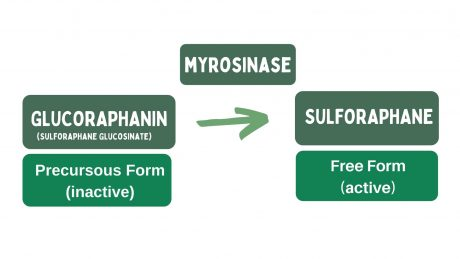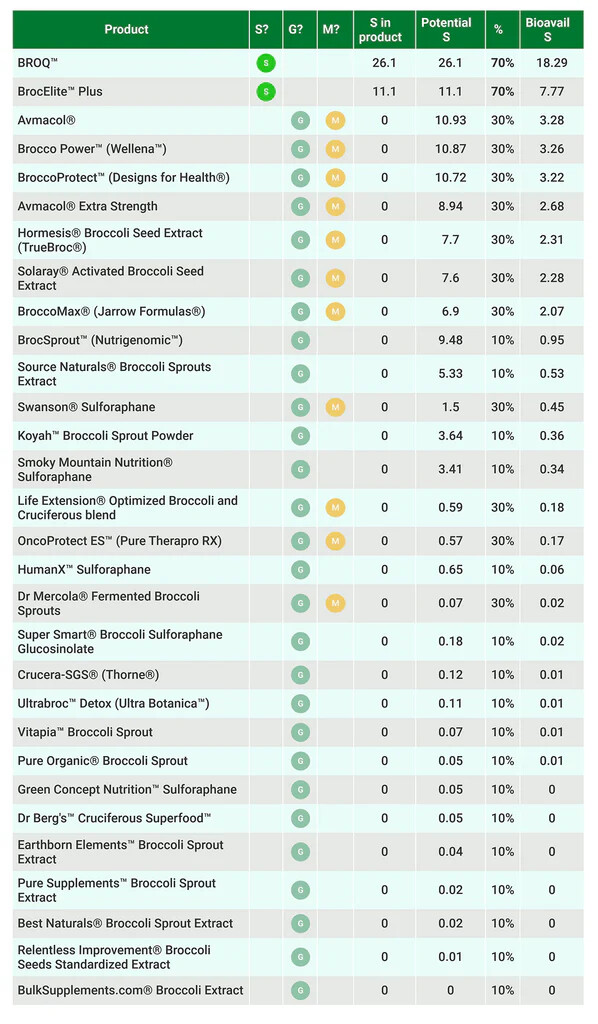adssx
#1
From what I understand, you don’t directly get sulforaphane but one of its precursors, such as glucoraphanin. What’s best to take? When? How? Has anyone already done the research?
Bryan Johnson takes this: Broccoli Seed Extract (Glucoraphanin 20 mg): 200 mg. (Note that the third-party test found 29.675 mg of glucoraphanin instead of 20 mg).
Dave Pascoe takes Extra Strength Avmacol:

There’s also this product, prostaphane. They claim:

Sulforaphane is naturally present in cruciferous in its precursor form – glucoraphanin (or “sulforaphane glucosinolate”).
The transformation of glucoraphanine into “free sulforaphane”, a bioactive molecule, requires the action of myrosinase (by hydrolysis). This mechanism occurs when the food is chopped, chewed or in contact with the intestinal bacterial flora. Nevertheless, myrosinase is heat-sensitive and is found in varying amounts in the plant and body.
There are several broccoli-based dietary supplements on the market. Most of them contain glucoraphanin, often under the misleading name “sulforaphane glucosinolate.” Glucoraphanin is an inactive molecule in this form. Studies have shown that glucoraphanine only allows 10% bioavailability in sulforaphane.
Prostaphane® therefore offers a dietary supplement based on free sulforaphane, which, unlike other dietary supplements, allows an average bioavailability of 70% in sulforaphane.
A capsule contains the equivalent of approximatively 380 g of raw broccoli.
Swanson, Life Extension and Jarrow also offer products with glucoraphanin or just broccoli extract.
7 Likes
Curious
#2
I have not used prostaphane myself ( I used broccomax). But I have heard a several times that https://www.prostaphane.com/ has a superior product. But ofc, that could also be the result of succesful marketing.
2 Likes
Josh
#3
Avmacol isnt too expensive and has shown benefit in clinical trials. The extra strength is actually a bit weaker since you only take 1 instead of 2. Jarrow is a bit cheaper and pretty reliable, you could take 3 instead of 2 pills.
Broq is the most expensive brand since they use actual sulforaphane instead of precursors.
Broq elite is too expensive and most other brands are basically scams, i wouldnt go below jarrow. Its expensive supplement and not super stable.
8 Likes
mccoy
#4
What’s the source of the illustrated data?
adssx
#5
Thanks a lot! BROQ is the rebranded version of Prostaphane for the US market (of course 2x more expensive for the same product  ): https://www.broq.life/
): https://www.broq.life/
BROQ was previously available only in France, under the brand name Prostaphane® a registered trademark of Ingood by Olga.
So I’ll give Prostaphane a try!
5 Likes
mccoy
#7
Is it me or does the fact that the study is illustrated on the manufacturer’s site, with a comparative analysis from a third-party lab paid for by the manufacturer itself, with the manufacturer’s product overwhelming all other products raise a sliver of doubt?
Could it be that there is some tiny conflict of interest there?
3 Likes
adssx
#8
Of course, there’s a conflict of interest, but lying would be fraud here, and if I were a competitor, I would sue them if the comparison wasn’t true. So we can expect that either the data is correct or there are dozens of ongoing lawsuits 
That being said, an independent review found similar results: Rhonda Patrick - Broccoli Sprouts, Sulforaphane & Moringa
Rhonda was using BROQ for a while but has since switched to Avmacol.
Rhonda notes that for some people, even taking 1 tablet (10 mg) with a meal can result in stomach discomfort. Therefore, as an alternative, she mentions that Avmacol may be kinder on the stomach.
1 gram of fresh weight sprouts is equivalent to 0.425mg of sulforaphane
Jed Fahey of John Hopkins University, one of the leading researchers in sulforaphane/NRF2, warns us to be careful of which supplement we use. His lab, which has analyzed dozens of supplements over the years, has found that many are terrible, and don’t contain what they say they do. For more info on Jed, see Rhonda’s interview with him. Below is a list of the sulforaphane supplements tested and used by Jed Fahey’s team at John Hopkins University in their clinical studies:
Pure Sulforaphane
5 Likes
mccoy
#9
Yes, I remember Rhonda’s interview with Jed Fahey, she was pretty fixated on sulforaphane, even drinking smoothies with some sprouts blended at controlled temperature, a process which appeared lengthy and difficult to obtain probably a very disgusting product! I also remember Fahey cited a French product as the only valid one, maybe the prostaphane you alluded to.
1 Like
adssx
#10
3 Likes
Josh
#11
Broq might not be as good as it claims but the ones on the bottom half of their list certainty are as bad as they claim. The usual suspects are there.
I think rhonda and fahey are independent and also like the same few brands, broq, avmacol and jarrow
Prostaphane® • Crucera SGS® (Thorne) • Oncoplex® (Xymogen) • Avmacol® • Vision Defense® (Swanson) • MaxN-Fuze® • MitoCORE® (Ortho Molecular Products
1 Like
Josh
#12
Its weird that thorne is mentioned as probably good and seems to not be? Its a good brand, as is life extension and thorne looks like it has none even, and LE very small, maybe they were going for natural broccoli levels.
mccoy
#13
Who knows if the analyses commissioned by the BROQ manufacturer contained some analytical problems? As far as we know, there might even be some legal issues arising.
Or perhaps it’s a technical issue, bioavailability, how that’s defined.
1 Like
adssx
#14
If there was an issue with the data:
- Competitors would have sent a cease and desist order to BROQ asking them to take down that page.
- At least one competitor would have released its own third-party test showing that its sulforaphane content is higher.
BROQ did their test in 2021 and the comparison page has been online since at least August 2022. More than 2 years later: nothing. And the fact that Prostaphane/BROQ has the highest sulforaphane content seems confirmed by independent “experts” Rhonda and Fahey.
So most likely: their ranking was broadly correct (in 2022), most supplements were shit, Prostaphane/BROQ was best, and there were a few second-best options, such as Avmacol.
Regarding Crucera SGS® (Thorne), I think that the version tested by BROQ in 2021 has changed since then. The version tested only had glucoraphanin (aka sulforaphane glucosinolate):

Whereas the new version also has myrosinase, and the glucoraphanin dose seems higher: Broccoli Seed Extract (formerly Crucera-SGS) & Reviews | Thorne
4 Likes
I interviewed Jed Fahey a couple of times. He advocates for Kuli Kuli moringa to get a similar benefit to sulforaphane.
6 Likes
LukeMV
#16
I used to take Avmacol and then later, BROQ, but it’s one of the most expensive supplements so I ended up discontinuing. I have to say the hype it received 5-8 years ago really got me excited about it so I’m very disappointed in the lack of research since then. It’s something I’ve been waiting on more data from because the potential is definitely there.
3 Likes
I think this fits the model of being one of many many solutions that will help the body to be healthier by a little bit but only if the diet is insufficient. And no one supplement will make a big difference (without a deficiency), and no one thing is much better than another thing (to resolve the deficiency).
In my protocol, supplements are only a good answer when there is an obstacle to eating a healthy diet. Hopefully the obstacle is temporary. The only other reason is calorie control. If I don’t want to eat all the food necessary to get the nutrients I want (but perhaps I don’t need so much anyway?). I don’t know. This is how I try to make it work.
3 Likes
Pat25
#18
There are so many issues to try to consume an ‘effective’ amount of sulforaphane. In short/very roughly: the supplements need to include myrosinase for your gut bacteria to be able to ‘produce’ sulforaphane from glucoraphanin. (Alternatively one could try grinding up some mustard seeds for myrosinase, but myrosinase levels are unknown and it needs to get into contact with glucoraphanin. Plus mustard seeds are high in erucic acid). Whether this conversion to sulforaphane is effective also depends on your intestinal microbiome. Epithiospecifier protein (ESP) will compete with myrosinase for the same substrate (glucosinolates), so product formation can shift away from sulforaphane. Dr. Patrick suggested heating broccoli sprouts to 60C, as heating can decrease ESP activity, which would then promote greater conversion of glucoraphanin to sulforaphane. Etc.
I looked into this at length years ago. I sprouted for years - not an ideal option to try to eat ~100g of broccoli sprouts every day, and ESP is still likely to decrease sulforaphane formation without 60C heating. Then for years I resorted to Prostaphane (seemed valid but ideally ought to be shipped on ice), and later another supplement from dried sprouts. (I’ve eaten quite a few unpalatable things without problem, but this supplement made me absurdly bloated and very nauseous for hours after consumption).
Avmacol is a good option. At the time I couldn’t get it here.
I resumed sprouting + blending recently. Someone said it tastes like “cat vomit” (excusez les mots). Albeit I can’t be sure, I believe that might be the most accurate description. Not sure how long I will be able to drink this ‘blend’ on a daily base. Nothing seems to cover up that taste.
6 Likes
Pat25
#19
Indeed Dr. Jed Fahey has suggested that moringa contains compounds that may also activate the NRF2 pathway (as sulforaphane does). But most of the research is done with sulforaphane, so we can’t be entirely sure, also not about effectivity, I’d think.
3 Likes
Davin8r
#20
I took Broccomax for years, also tried Broq and Avmacol. Now I just buy bags of baby kale at Trader Joe’s or Whole Foods and throw it in the freezer, then put a big handful into my morning smoothie each day. It’s far cheaper than the extract pills and also provides carotenoids, potassium, fiber, etc in addition to glucosinolates.
6 Likes